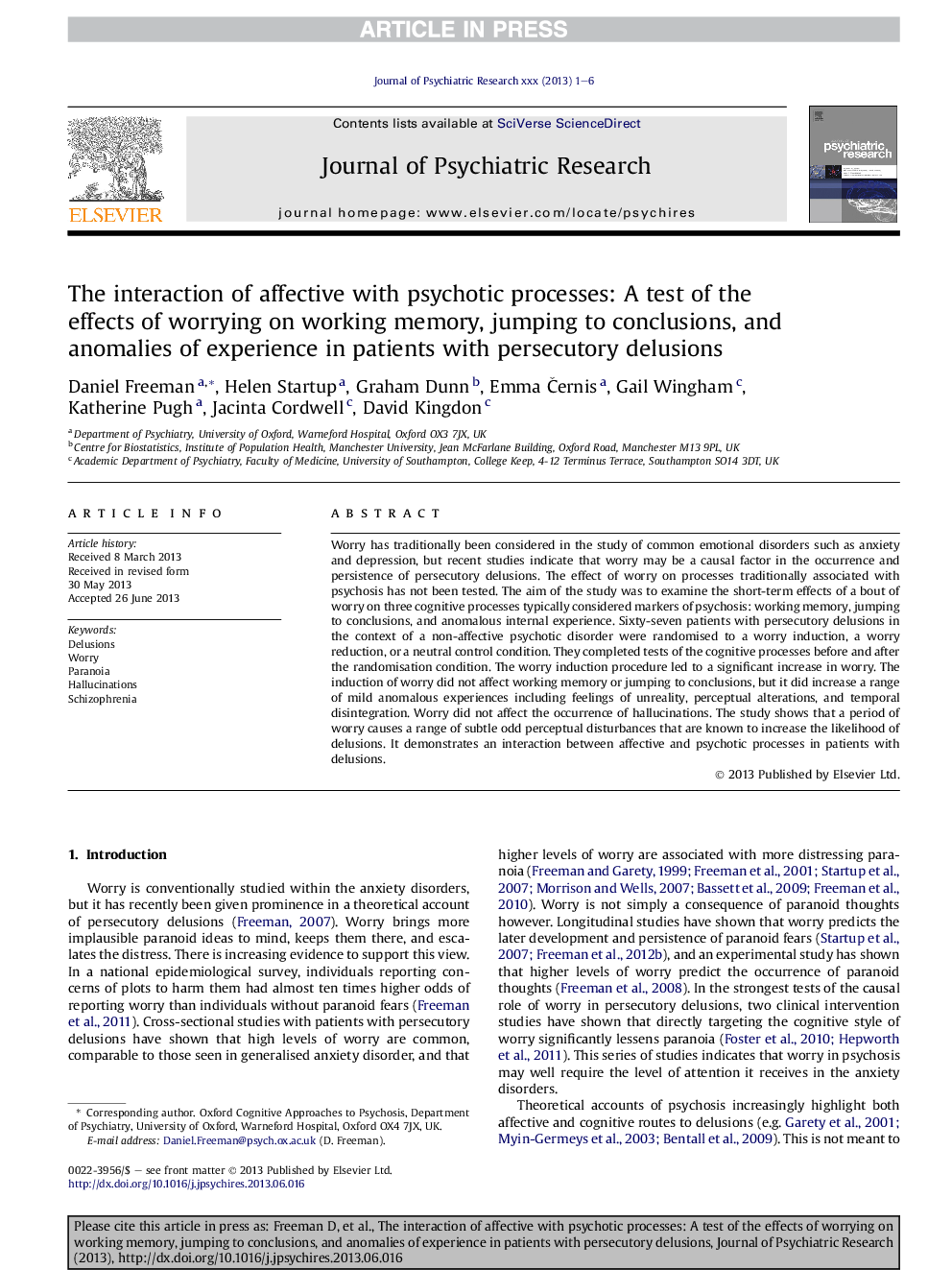| کد مقاله | کد نشریه | سال انتشار | مقاله انگلیسی | نسخه تمام متن |
|---|---|---|---|---|
| 10301880 | 542453 | 2013 | 6 صفحه PDF | دانلود رایگان |
عنوان انگلیسی مقاله ISI
The interaction of affective with psychotic processes: A test of the effects of worrying on working memory, jumping to conclusions, and anomalies of experience in patients with persecutory delusions
ترجمه فارسی عنوان
تعامل عاطفی با فرآیندهای روان درمانی: آزمون اثرات نگرانی در مورد حافظه کاری، پریدن به نتیجه گیری و ناهنجاری های تجربه در بیماران مبتلا به بدبختی های آزارنده
دانلود مقاله + سفارش ترجمه
دانلود مقاله ISI انگلیسی
رایگان برای ایرانیان
کلمات کلیدی
اتهامات نگرانی، پارانویا، هذیانها، جنون جوانی،
ترجمه چکیده
نگرانی به طور سنتی در مطالعه اختلالات عاطفی عادی مانند اضطراب و افسردگی مورد توجه قرار گرفته است، اما مطالعات اخیر نشان می دهد نگرانی ممکن است عامل مهمی در وقوع و تداوم هرج و مرج اذیت کننده باشد. تاثیر نگرانی در فرآیندی که به طور سنتی مرتبط با روانپزشکی است مورد آزمون قرار نگرفته است. هدف از این مطالعه بررسی اثرات کوتاه مدت نگرانی بر روی سه فرآیند شناختی است که معمولا نشانگرهای روانپزشکی را شامل می شوند: حافظه کاری، پریدن به نتیجه گیری و تجربه درونی داخلی. شصت و هفت بیمار مبتلا به تصلبات اذیت و آزار در زمینه اختلال روانپزشکی غیر عاطفی به صورت تصادفی، کاهش نگرانی یا وضعیت کنترل خنثی به طور تصادفی انتخاب شدند. آنها تست های فرآیند شناختی را قبل و بعد از شرایط عادی انجام دادند. روش القای نگرانی منجر به افزایش چشمگیر نگرانی شد. القاء نگرانی بر حافظه کاری و یا پریدن به نتیجه گیری تأثیر نگذاشت، اما طیف وسیعی از تجربیات غیرطبیعی خفیف از جمله احساسات غیر واقعی، تغییرات ادراکی و فروپاشی زمان را افزایش داد. نگرانی بر وقوع توهم ها تاثیر نمی گذارد. این مطالعه نشان می دهد که یک دوره نگرانی موجب اختلالات ادراکی عجیب و غریب می شود که احتمال بروز خطاهای احتمالی را افزایش می دهد. این نشان دهنده تعامل بین فرآیندهای عاطفی و روانی در بیماران مبتلا به لجاجت است.
موضوعات مرتبط
علوم زیستی و بیوفناوری
علم عصب شناسی
روانپزشکی بیولوژیکی
چکیده انگلیسی
Worry has traditionally been considered in the study of common emotional disorders such as anxiety and depression, but recent studies indicate that worry may be a causal factor in the occurrence and persistence of persecutory delusions. The effect of worry on processes traditionally associated with psychosis has not been tested. The aim of the study was to examine the short-term effects of a bout of worry on three cognitive processes typically considered markers of psychosis: working memory, jumping to conclusions, and anomalous internal experience. Sixty-seven patients with persecutory delusions in the context of a non-affective psychotic disorder were randomised to a worry induction, a worry reduction, or a neutral control condition. They completed tests of the cognitive processes before and after the randomisation condition. The worry induction procedure led to a significant increase in worry. The induction of worry did not affect working memory or jumping to conclusions, but it did increase a range of mild anomalous experiences including feelings of unreality, perceptual alterations, and temporal disintegration. Worry did not affect the occurrence of hallucinations. The study shows that a period of worry causes a range of subtle odd perceptual disturbances that are known to increase the likelihood of delusions. It demonstrates an interaction between affective and psychotic processes in patients with delusions.
ناشر
Database: Elsevier - ScienceDirect (ساینس دایرکت)
Journal: Journal of Psychiatric Research - Volume 47, Issue 12, December 2013, Pages 1837-1842
Journal: Journal of Psychiatric Research - Volume 47, Issue 12, December 2013, Pages 1837-1842
نویسندگان
Daniel Freeman, Helen Startup, Graham Dunn, Emma Äernis, Gail Wingham, Katherine Pugh, Jacinta Cordwell, David Kingdon,
